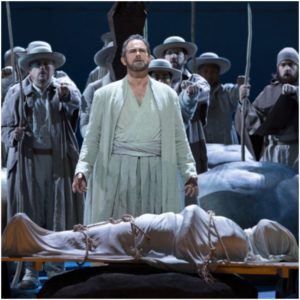
Opera Profile: Rossini’s Final Masterpiece ‘Guillaume Tell’
By David SalazarRossini’s final opera is arguably his finest.
“Guillaume Tell,” which had its world premiere on August 3, 1829, has never been his most popular. But in the work, the great composer took all the dramatic ideas he had developed throughout his career and encapsulated them into a cohesive and potent opera.
The work has found popularity in the 21st century, its dramatic power an attractive creative outlets for directors.
Short Plot Summary
William Tell is restless of Switzerland’s oppression under Gesler. Arnold is chided by his father for not marrying, but he is in love with Mathilde, who hails from the enemy Austria. During a wedding festivity, a wounded shepherd Leuthold explains that he killed one of Gesler’s men to defend his daughter. Tell helps Leuthold escape as Gesler’s men arrive. Arnold’s father is taken prisoner for not revealing the identity of Leuthold’s helper.
Mathilde and Arnold meet and reveal their love for one another. She asks him to join the Austrians and fight for glory. After she leaves, Arnold is confronted by Tell and Walter. They tell him that Gesler has executed his father and Arnold immediately pledges allegiance to the Swiss.
Arnold tells Mathilde of Gesler’s crime and she realizes that they cannot be together. Meanwhile Gesler captures Tell’s son Jemmy and forces Tell to fire an arrow at an apple over his son’s head. Tell takes two arrows, hiding one, and manages to pass the test. Gesler notices the second arrow and Tell confesses that he plans to use it to kill him. Jemmy and Tell are captured once more, but Mathilde arrives and claims Jemmy for herself.
Arnold vows to save Tell.
Tell manages to pilot a ship that is headed for shipwreck. Tell ultimately kills Gesler and then Arnold arrives to tell the others that they have taken Altdorf, the main palace. Mathilde joins Arnold and promises to stand by his side in the battle for independence.
Famous Musical Excerpts
The opera’s overture is iconic in pop culture, though it should be noted that only the last part (of four) is well-known. The ingenious design of the overture, which features four episodes shows Rossini at his most experimental.
The opera also contains famed arias for Arnold, Mathilde, and Tell.
Watch and Listen
Here is a recent revival starring Roberto Frontali and Nino Machaidze with Dmitry Korchak.
Categories
Opera Wiki

